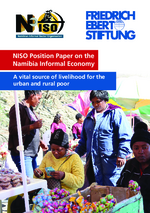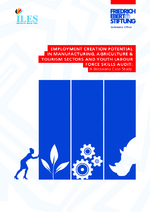The economies of African countries are predominantly characterised by the export of natural resources such as fossil fuels and minerals, as well as agricultural products. Local value creation on the continent is severely limited and many industrial products have to be imported. Economic growth has not usually been accompanied by the creation of formal jobs; over 85% of Africans work in the informal sector, sometimes under very precarious conditions. Young people in particular have little access to formal employment, meaning that social advancement remains out of reach for the majority. In order to harness the potential of young people and create good jobs at the same time, political dialogue involving trade unions and civil society expertise, as advocated by the FES, is crucial.
Economic development can only work in a functioning state. Many African countries are economically weak, and state revenue streams are in decline. Strong economic dependence on international markets means that fluctuations in commodity prices have a considerable impact on the economy and state finances. This is also due to historical path dependencies that date back to colonial times. Several countries are also experiencing structural debt and financial crises, and the often substantial national debt makes it impossible to invest in the future. At the same time, the continent as a whole is facing major economic challenges due to climate change. To achieve the UN's sustainable development goals by 2030 alone, the continent lacks almost 200 billion dollars in funding every year.
Nevertheless, African governments are working on innovative solutions, often under the umbrella of the African Union. One of these projects is the African Continental Free Trade Area (AfCFTA) to promote intra-African trade. In order to continue to be an attractive partner for the continent, Germany and the EU must also make good economic offers to the continent's predominantly young population. This includes, for example, strengthening social security programmes, mobilising financial support, also against the background of the historical responsibility for climate action, and collaborating on the reform of the international financial architecture. The work of the FES in Africa often focuses on these areas in order to strengthen partnerships both on the African continent and with Germany and the EU and to shape them in a socially just manner.
Europe in Africa
Europe is still Africa's largest trading partner and trade policy is a decisive factor for development. African countries' trade relations with the EU are often characterised as asymmetrical. This can be seen, among other things, in the fact that Europe often exports expensive and highly sophisticated technology to Africa, while African countries often export unprocessed raw materials. These are sometimes subject to enormous price fluctuations, which makes African economies particularly vulnerable to crises. Europe must take a closer look at the concerns of African countries when shaping trade relations. Only a change in EU trade policy can fulfil Europe's claim to have relations "on an equal footing" with African countries. The FES advocates a readjustment of European trade policy that places sustainable economic development on the African continent in line with the 2030 Agenda and puts the regional integration efforts of African states more at centre stage.





